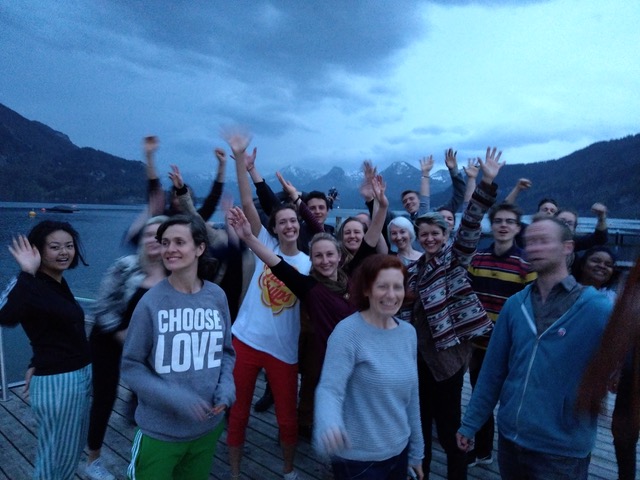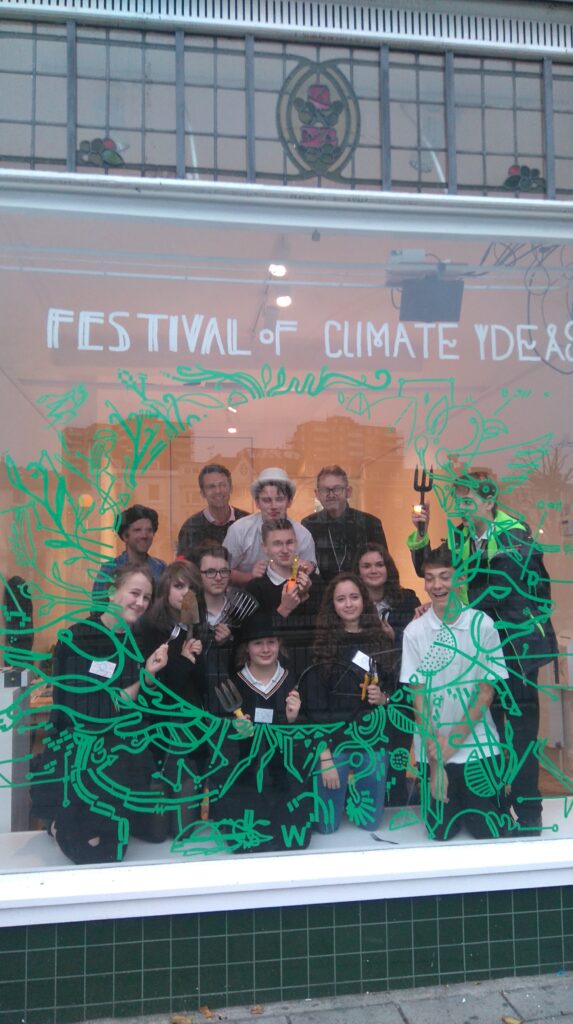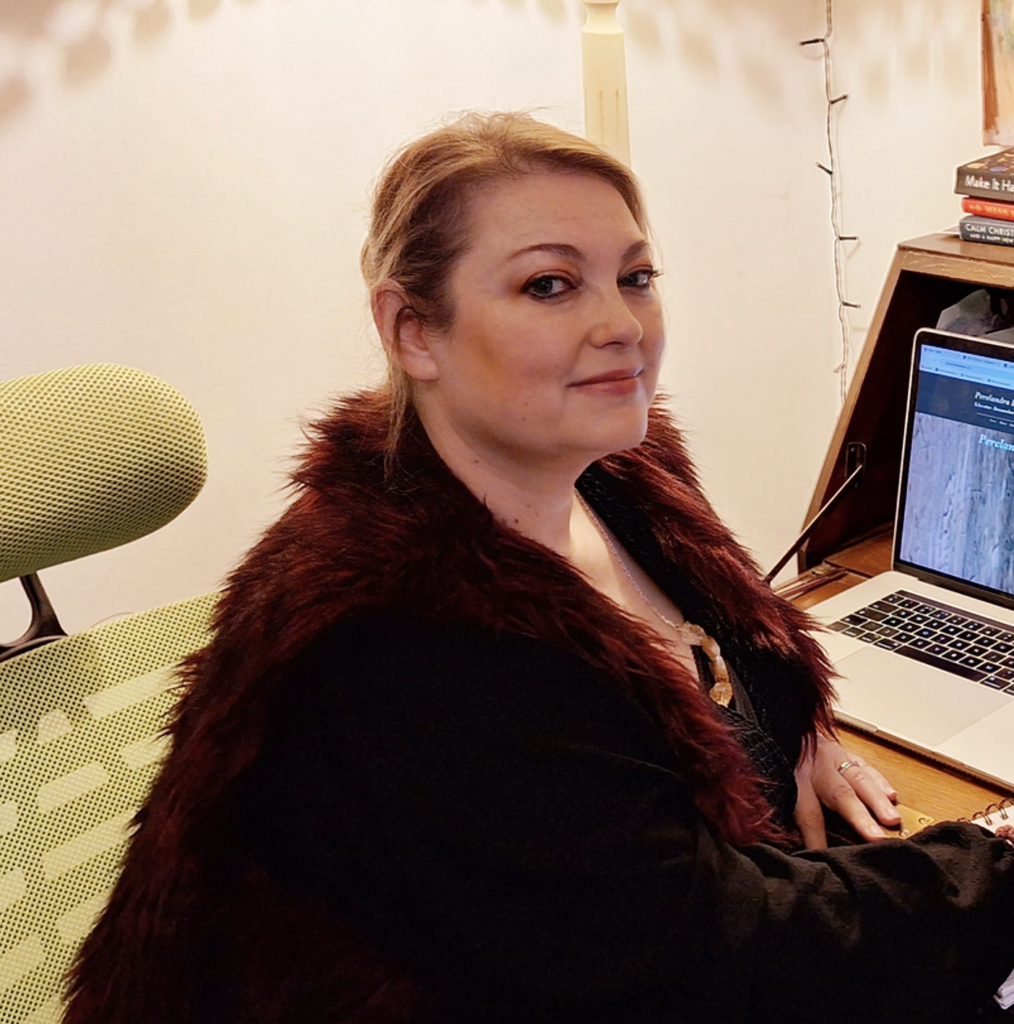Our seminar series takes place online to remain inclusive. We aim to cover a variety of topics and interests, and want to keep the seminars flexible, to allow the breadth of research into television to become visible.
Seminars in 2024
21 February 2024
Communicating climate change: cultivating creativity, collaboration and participation
Julie Doyle, School of Art and Media, University of Brighton

Climate communication researchers and practitioners call for new climate stories that go beyond apocalyptic imaginings to offer more culturally meaningful narratives and engagements (Moser 2016; Good Energy 2024). As such, climate communication is a constitutive dimension of climate action, shaping cultural understandings and societal responses to climate change (Carvalho, Russill & Doyle 2021). Drawing upon my experiences of working on a number of creative climate communication projects with young people in the UK and Europe (Doyle 2020, Cli-Mates 2017; System Change Hive 2019), in this talk I will explore how collaborative and participatory approaches to climate communication can help facilitate multidimensional and interdisciplinary modes of climate learning and engagement.
In foregrounding playfulness, co-creation, emotional sharing and interdisciplinarity, collaborative approaches can facilitate (young) people’s socio-cultural understandings of climate change and increase self and group efficacy. Discussing these findings, the talk will also reflect upon the challenges of time/space specific learning experiences and collaborative projects for researchers and participants. Despite these challenges, I argue for the need to work together across disciplines and practices, and in careful collaboration with communities, to foster new climate stories and engagements.
Biography
Julie Doyle is a Professor of Media and Communication in the School of Art and Media at the University of Brighton, UK. Julie’s research explores the role of visual media and popular culture in shaping societal understandings of, and responses to, climate change. Julie also works collaboratively with artists and cultural educators on co-created climate communications projects that seek to facilitate transformational climate learning experiences. She has provided consultancy for environmental NGOs, government and the sustainability communications sector on best practice for climate and environmental communication. She was a member of the founding Board of Directors of the International Environmental Communication Association (IECA), is on the Editorial Board of Environmental Communication, and her research is cited in IPCC Assessment reports.

March 2024

11 March 2024, 7pm UK time
Book Launch: TV Drama in the Multiplatform Age, edited by Trisha Dunleavy and Elke Weissmann, Cham: Palgrave Macmillan (2024).
Presenters: Trisha Dunleavy (Te Herenga Waka/Victoria University of Wellington, New Zealand), Richard Paterson (University of Glasgow) and Joanna Rydzweska (Swansea University).
Book Launch: TV Drama in the Multiplatform Age (Palgrave Macmillan 2024)
We invite you to join our book launch for the TV Drama in the Multiplatform Age: Transnational Coproduction and Cultural Specificity (Palgrave Macmillan, 2024), edited by Trisha Dunleavy and Elke Weissmann. We will hear three short presentations from our authors:
Trisha Dunleavy (Te Herenga Waka/Victoria University of Wellington, New Zealand) will introduce the book project and introduce the larger scope of the book. This will include a discussion of the role of multi-national corporations, the importance of SVoDs and the explosion of different forms of coproductions, involving local as well as transnational companies, cultural elements and processes.
Richard Paterson (University of Glasgow, UK) will present the story of The Man in the High Castle (Amazon Prime, 2015-19) the first UK commission for Amazon Prime. He will discuss how the small production company that developed the project, namely Headline Pictures, negotiated the involvement of a number of big players in the process of getting the programme made.
Joanna Rydzewska (Swansea University, UK) will present her work on World on Fire (BBC, PBS, 2019-) which unusually for a British production about the Second World War spends significant time introducing the experience of Polish people both in Poland and abroad. She will highlight the programme’s representational strategies as well as consider the role of local diasporas in the UK and the USA and their place in the (trans)national imaginaries of the UK and the USA.
Biographies:
Trisha Dunleavy is Associate Professor in Media Studies and Communication at Te Herenga Waka/Victoria University Wellington, New Zealand. Her central research interests are multiplatform television, creative industries, high-end TV drama, TV drama and aesthetics and transnational coproduction. She is co-editor of the book Transnational Television Drama in the Multiplatform Age (Palgrave Macmillan, 2024).
Richard Paterson is Honorary Professor and Research Associate in the Centre for Cultural Policy Research at the University of Glasgow. He was formerly Head of Research and Scholarship at the British film Institute and is currently editing a Gedenkschrift for Tony Smith, the architect of Channel Four to be published by Bloomsbury Academic next year.
Joanna Rydzewska is Senior Lecturer in Film and TV Studies at Swansea University, UK. Her research focuses on European, Eastern European and British cinema with particular emphasis on exile, migration and transnational film studies. She has co-authored with Elżbieta Ostrowska The Films of Paweł Pawlikowski (EUP, 2024).
The event has been recorded and can be seen here.
25 March, 12.30pm
Reflective Reels – The Impact of Embedding Reflection into Film and Television Production Management Training
Perelandra Beedles (University of Salford)
In the realm of higher education within the creative arts, it is imperative to instil a reflective approach in students. While reflection is often a component of assessment criteria for written assignments, it is frequently overlooked in curricula for technical training within film and television production degrees. This oversight neglects the growing need for reflective practitioners in the media industry.
To address this issue, the research presented in this session introduced an educational toolkit named ‘Reflective Reels’ to early career Television Production Managers. This toolkit included breakout sessions for reflection, production journals, and video diaries. By emphasizing the practicality of reflection as a tool that can be directly linked to action, this approach views training as a dynamic process that combines technical knowledge and intellectual agility.
The name ‘Reflective Reels’ is a nod to the film and television industry, while also showcasing how each step of knowledge retention and reflection can be effortlessly intertwined, much like the reels of a film. Ultimately, this toolkit empowers learners to create novel processes and interpretations of training actions.

Perelandra Beedles has worked extensively as a Television Director, Producer and Production Manager at the BBC, ITV and Sony Film and Games and is now a Lecturer and Programme Leader for the MA Production Management Film, TV and Media at the University of Salford. Additionally, she is engaged in an EdD Research project at Edge Hill University, titled ‘Reflective Reels’. This project aims to analyse the impact of incorporating reflection into film and television production management training.
The talk was recorded and can be accessed here.
May 2024
1 May 2024, 1pm
Catherine Johnson (University of Leeds):
What’s at Stake in the UK Media Bill?

The UK Parliament is currently debating the introduction of a new Media Bill that is expected to be passed into law this summer. The Media Bill aims to future-proof the UK’s media regulation in the wake of significant changes since the 2003 Communications Act. This paper sets out the key interventions of the Media Bill and discusses what the implications of the proposed legislative changes might mean for the UK’s media landscape. In doing so, it focuses on changes to legislation underpinning public service media, the introduction of ‘prominence’ legislation, and the development of a new ‘VOD Code’ that extends responsibilities accorded to broadcasters for protection from harm to VOD services. It asks whether these policy interventions go far enough in addressing the current challenges facing the UK’s media landscape and interrogates what is absent from the Media Bill.
The recording is available here.
